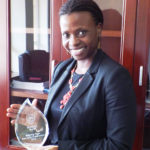
A leading German biometrics manufacturing firm Dermalog has been awarded the ‘2015 African Biometrics Company of the Year Award’.
Dermalog Identification Systems is one of the world’s leading companies for biometric identification, offering its Automated Biometric Identification System services to governments and private organisations in Europe and other major markets like Africa, Asia, Latin America, and the Middle East.
So far Dermalog has delivered 150,000 fingerprint scanners to over 70 countries and also delivered over 130 ‘large ABIS’ installations that have helped in registration and immigration processes for governments around the world.
According to a release, Dermalog was given the award in recognition of its work in 20 African countries including Nigeria, where the Hamburg-based company is carrying out a US$50 million project secured with the Central Bank in 2013 and, also offers services to 23 other commercial banks in the heavily-populated West African country with a history of fraud.
And, since 2013 Dermalog’s ABIS has helped detect over one million individuals attempting to obtain double or multiple identities in Nigeria, thereby preventing fraud and money laundering in the financial sector. The company has also been able to register over 18 million bank customers in the vast African country.
‘Using Dermalog fingerprint scanners and software, all participating banks can ensure that for all transactions, the identity reliably matches the customer because the customer must always be physically present for the registration,’ the release states and adds that in the near future, registered bank customers in Nigeria will also be able to withdraw cash from ATMs and pay at cash machines using their fingerprints.
Other African countries where Dermalog operates include Angola, Ghana, Tanzania, Zambia and in South Africa, where the award issued by consulting company Frost & Sullivan, was handed over.
‘It contributes sustainably and decisively to solving local challenges such as identity theft, corruption, demography, and migration as well as the economic development of these countries,’ the release by Africa Press Organisation (APO) states in part.







